I Took Down a Fraudulent Breast Cancer Charity
October is the month of pink ribbons (and pink everything), generating awareness—and money—for a worthy cause. Except when it's a scam.
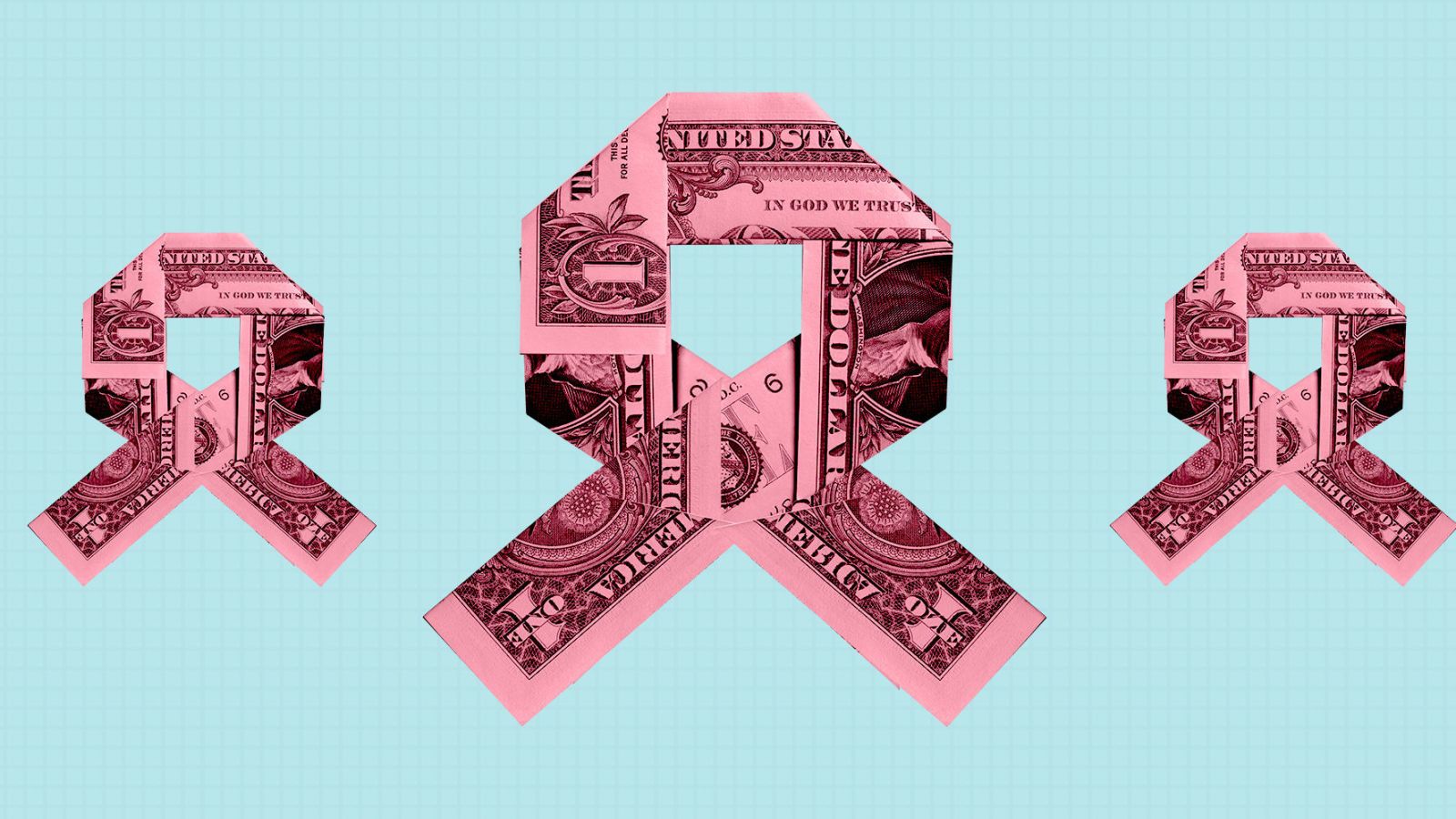

Boobies do rock!" a Notre Dame football jersey-clad guy yelled out, responding to my shirt as I walked toward him and his group of tailgating friends.
"They sure do!" I replied, smiling. "Do you want to make a donation to support breast cancer awareness and get one of these 'Boobies Rock!' shirts for yourself?"
The group laughed as I showed them my wares, which featured phrases like "I heart motorboating." They joked about which of them would be most likely to wear one in public, and asked if the proceeds went to charity. I said yes, reciting what Boobies Rock! had told me to say: "Boobies Rock! has pledged to donate $100,000 to breast cancer charities this fall, $50,000 of which is going to The Pink Fund in Detroit."
Two of the guys bought $20 T-shirts, and all four of them bought beer koozies for $5. Most paid cash, but one used a credit card, which I processed through Square and said, "Make sure to get the receipt emailed so you can report this donation at tax time!"
I had no clue that day that I'd soon be mired in a legal battle with that very group, threatened with lawsuits and financial ruin—all for trying to do some good.
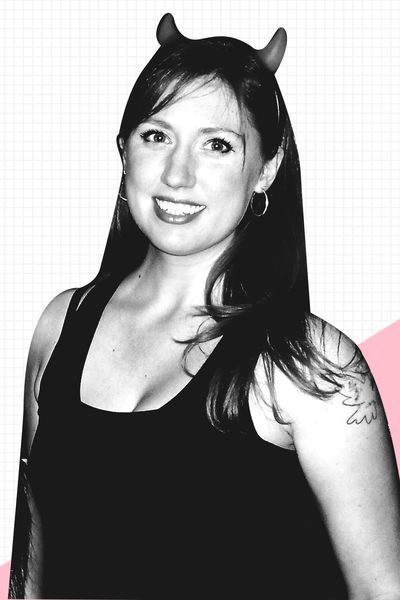
The author at one of her other promotional jobs in 2012
My short stint as a Boobies Rock! promotional model took place over three days in October of 2012. Back then, I was a struggling freelance copywriter living in Chicago, and did promo gigs on the side for extra cash. When I saw a Boobies Rock! ad listed on Craigslist, I debated with myself before applying—I generally believe men should care about cancer without having it sexualized for them, but the money was too good to pass up. Boobies Rock! was offering around $200 for a single day of work, on top of covering travel to and hotel stays at promotional locations. I figured why not—I could enjoy earning a lot of money while also supporting a good cause. After all, who cares if I had to tolerate drunk men joking about boobs for a few hours if it would help both my bank account and women with cancer?
The day before my first day of work, a 24-year-old blonde woman who I'll call Laura* picked me up at my apartment in a nice rental car. As we drove to Indiana, she talked about how much she enjoyed her job: flying around the country and driving nice cars to pick up promotional models and drive them to football games in each new state she visited. We picked up two other models in northwest Indiana and then made our way down to South Bend, home of the University of Notre Dame, where we all checked into a hotel.
Stay In The Know
Get exclusive access to fashion and beauty trends, hot-off-the-press celebrity news, and more.
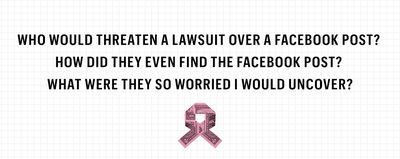
The next morning, we woke up at the crack of dawn to cram bags full of rolled-up T-shirts, koozies, and bracelets, all emblazoned with boobies-centric slogans and illustrations. Laura drove us to the parking lots full of tailgaters at Notre Dame. She told us that while we had permission to be there, we should walk the other direction if we saw any security guards because sometimes they proved to be a hassle. She instructed us to ask for "donations," and forbade us from using the words "buy" or "sell"—we were awarding "prizes" to people who donated to the cause.
I felt uneasy. I'd had to share a bed with Laura the night before, which was unconventional to say the least. That combined with the directive to avoid security and the language specifications raised a red flag for me about the quality of this operation. Still, I was already there, so I did my job.
While I felt shy and embarrassed about approaching people to talk about breast cancer, most tailgaters were warm, inviting, and generous. Some of them gave me money even though they did not want a "prize" in return. One man pulled me aside and tucked a $20 dollar bill into my hand, whispering "my wife died of breast cancer" as his eyes teared up. By the end of the afternoon, I felt more confident that I was doing a good thing.
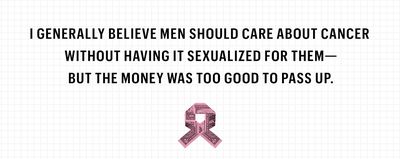
Shortly after the tailgaters piled into Notre Dame's stadium to watch the game, I reconvened with Laura and the other promo models in the SUV to count over a thousand dollars in cash we had collected. Laura commented that she always felt "like a drug dealer" after working, especially when she got onto a plane back to Denver with so much money in her bag. I asked why she didn't deposit it somewhere—she answered that sometimes she did, sometimes she didn't. That stood out to me as suspect: Wouldn't there then be no consistent way to track how much was donated to the charities we had claimed to help?
When Laura dropped me off that evening, she asked me to work for Boobies Rock! again at a Bears game a few days later. She said she was asking only me and no one else because I'd stood out to her—she could see me becoming a manager like her. Although I had an unsettled feeling again, I said yes—I was flattered by the compliment and curious about the opportunity. The money was tempting too, and I truly wanted to believe I was supporting a great cause. It was like I had stumbled upon the holy grail of side hustles.
Sunday came and Laura picked me up again. We followed the same drill but the vibe was totally different, only partially because of bad weather—as I trudged through the rain, several people openly said things like, "You know you're running a scam, right?"
The comments unsettled me. As soon as I got home that evening, I researched Boobies Rock! online. First, I found on their own website that they were a for-profit company that made donations, not a non-profit organization. I uncovered a scam report on ripoffreport.com alleging that they did not make the donations they claimed they did, and after googling Boobies Rock! and founder Adam Shryock, I discovered that he had a history of complaints against him, all regarding business fraud.
Rattled with guilt, I posted the question on my Facebook page to see what my immediate network might know: "Is Boobies Rock! a scam?" Soon after, I received an email from Se7ven Group, a company that claimed to own Boobies Rock!, accusing me of slander, and threatening to bring a lawsuit against me if I continued to disparage their organization.
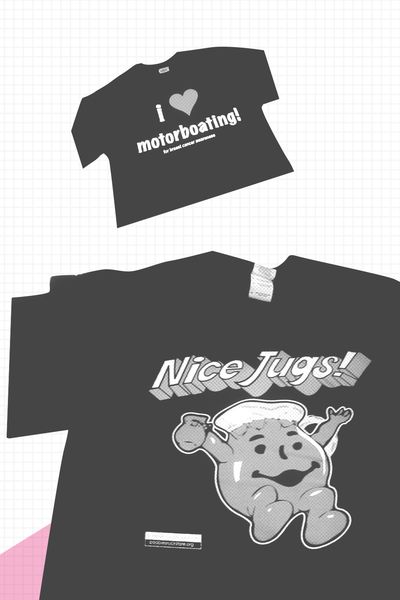
But wait. Who would threaten a lawsuit over a Facebook post? How did they even find the Facebook post? What were they so worried I would uncover?
So I did more research. I called every single charity Boobies Rock! had told me they donated to or had listed on their website. Some had never even heard of them, or received any donations. Others had received token amounts of $100 or $200 a year or two earlier. The charity in Detroit I had been boasting about to potential donors said they were not aware of a $50,000 pledge. A lady at one nonprofit raised her voice at me, telling me that I worked for a bad organization. I assured her that I had quit and would never work for them again now that I was uncovering all their lies. She yelled, "You should've done the research before you worked for them!" and then hung up.
Of course, she was right. Not only was Boobies Rock! scamming their donors and the organizations they said they donated to, but they were also scamming their employees. They had scammed me.
I searched the founder's name in Facebook and saw photos of his palatial Colorado home. I seethed. The house was beautiful, complete with a granite fireplace and charcoal fire pits burning while his Alaskan Husky lounged about. There were also photos of him surrounded by women and drinking in dark bars, and I recall another with his girlfriend standing next to an expensive-looking Range Rover. I thought of the people who had given me cash without wanting anything in return. I became furious.
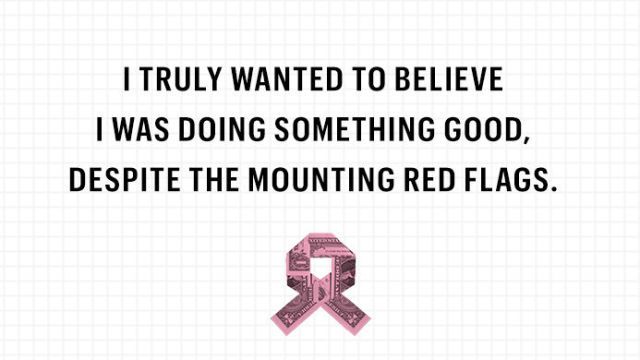
I wanted the whole world to know what Shryock was doing, so I reached out to the press. I put together a PDF packet with all my research, outlining the evidence that Boobies Rock! was a scam, and sent it to dozens of news outlets. But only one responded: the Chicago Sun-Times. Stephanie "The Fixer" Zimmermann, a consumer-focused investigative journalist, contacted me and the other women I had worked with at the Notre Dame game for an interview. Apparently a major article was in the works.
I received three emails from Boobies Rock! owner Se7ven Group urging me to stop talking to reporters. The emails contained ominous—but amateur—wording, like: "This can be very dangerous when you decide to start doing the things you are doing and I hope that our previous decisions to take action against those who spread these false statements is enough to show you how serious [sic] we take this," and "Why would you want to put yourself in a situation that could potentially cost you thousands of dollars? It just doesn't make any sense." The final email ended by saying I could expect to hear from their attorney.
I was struggling for money myself and knew that I couldn't afford a lawsuit. But I kept moving forward anyway.
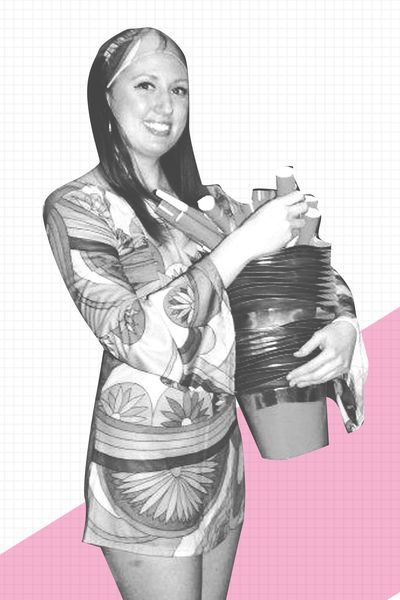
I contacted the Better Business Bureau, the IRS, the Illinois and Indiana Attorneys General, and any charity or consumer reporting websites I could find. The Illinois Attorney General asked me to come in for an in-person interview and to sign an affidavit. The City of Chicago also responded, saying they were getting involved as much as they could, trying to cite Boobies Rock! for selling merchandise within city limits without a permit.
Shortly after, Boobies Rock!'s attorney called me. He was straightforward, asking me what went wrong with my employment, what I was angry about, why I was "making things up," and how the company and I could reconcile our differences. It was clear he had been told I was nothing more than a disgruntled employee—in fact, I was the one who illuminated the company's shady practices to him. Our conversation went something like this:
Me: I called The Pink Fund, who said there's no $50,000 pledge. Why doesn't the charity know about the contract?
Him: You must've talked to a volunteer who didn't know. The CEO knows about the contract. The CEO is Molly MacDonald. She signed it.
Me: Molly signed it? She's the one I spoke to on the phone who said there was no contract.
Him: You spoke to Molly MacDonald?
Me: Yes, she said she wished Boobies Rock! would stop using The Pink Fund's name and recommended I never work for them again. But you're saying Adam gave you a contract with her signature on it?
Him: Um, uh, I have to go now. I will be contacting you again in the near future.
I never heard from him again.
On November 27 2012, the front page of the Chicago Sun-Times blared the headline "Cashing in on Cancer" with a photo of Adam Shryock. Not long before, I found out from The Pink Fund in Detroit that they had suddenly received a $50,000 check from Boobies Rock!—but the donation was too little too late.
Initially, I felt satisfied. Facilitating an actual $50,000 donation to a breast cancer charity and the front-page Sun-Times article were more than enough penance to cancel out my two days of working for such a scam, I reasoned. But I learned that Shyrock's scam was much larger than I had originally estimated, and my close friends and family urged me to stop being involved—they were concerned for my safety.
"Are you trying to get killed?" one friend asked me after reading about all the millions of dollars Shyrock pocketed.
I remembered the scary emails I'd received from the Se7ven Group. Initially, they seemed like legal threats, but upon rereading them, I wasn't so sure. Specifically this line: "This can be very dangerous when you decide to start doing the things you are doing…"
"Dangerous" isn't a word normally used to describe going to court. I now worried whether that line was a coded physical threat.
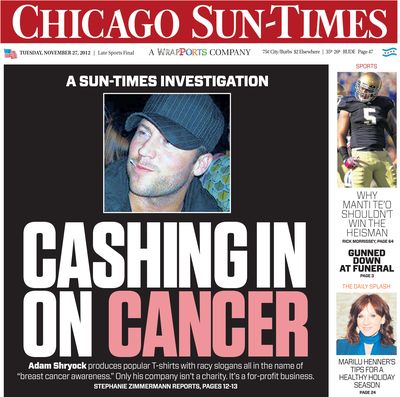
I told myself that it'd be easy to walk away. I had, after all, relieved my guilty conscience. But I just couldn't let it go—the company appeared to still be alive and well despite the negative press.
Google showed that Boobies Rock! was still hiring promo models via Craigslist all over the country, even in Chicago. Recent event photos were being posted to various social media accounts showing women like me still selling the shirts I had been handed at the Notre Dame game.
Exposing Boobies Rock! had become my second job, and I didn't think my work was done.
I contacted every single Boobies Rock! Facebook and Twitter account I could find, urging promo models to quit their jobs and reach out to local news outlets and their states' Attorneys General. Many did. As the word spread, other women contacted me, asking how they could help. They felt hurt, angry, betrayed. Some of them had a family connection to breast cancer and had sought out their jobs wanting to help with the cause. Meanwhile, Boobies Rock! was working on damage control. I learned that Boobies Rock! managers had emailed the promo models, telling them I was an angry person retaliating against the company because I had been fired, and that Zimmermann only wrote an article because she was my aunt (Zimmermann is not a relative of mine).
I created a list of Boobies Rock! employees around the country who were willing to talk to the media. I then contacted more media outlets, providing them the Sun-Times article and contact info for local Boobies Rock! employees who were willing to be interviewed. This time, more news outlets paid attention. Articles outlining Boobies Rock!'s unethical practices popped up in Arizona, Colorado, Indiana, New York, and on USA Today's website. Several local TV news outlets ran short segments on the story.
And then, finally, justice prevailed. In July of 2013, a Colorado court ordered Shryock to close down Boobies Rock! and prohibited him from raising money for another charity. In January of 2014, he was found in contempt of court for organizing another group, "I Heart This Bar," still using promotional models to raise $65,000 for a made up "scholarship fund," and sentenced to two weeks in jail. (He had also started an enterprise called "Say No 2 Cancer" that worked similarly to Boobies Rock!).
In January of 2015, there was an even bigger announcement: Shryock was sentenced to six months in jail for violating the 2013 court order that prohibited him from raising money for charity a second time, and for falsely associating himself with a legitimate organization, Stupid Cancer. He played the role of "consultant" and claimed the business was run by someone else. Three months later, after a trial, he and his companies were ordered to return $1.89 million in gross receipts and to pay $4 million in civil penalties. Plus, they were permanently banned from charity work.
But Shryock hasn't laid low. Just seven months ago he was charged in another scam, this time because he and business partner, Genevieve Cruz, took mattresses from Ecumenical Refugee and Immigration, a non-profit where Cruz worked, and sold them out of the back of rental storage trucks for profit. Shryock pleaded guilty. He was sentenced to 90 days in jail and four years probation.
Nearly four years after I first hustled that Notre Dame parking lot with Boobies Rock! merchandise, I not only feel vindicated, but as though I've learned something powerful about myself. I am a woman who stands up for what she believes in—no matter the threat or cost.

*Names have been changed.
Jay Thompson is a writer from Elgin, Illinois who loves the ocean and sky and tweets from @jayverasummer.
-
 The "Frightening" Easter Prank William Played on Eugenie
The "Frightening" Easter Prank William Played on Eugenie"Prince William has just stood on a chair and bitten the mouse's head off."
By Amy Mackelden
-
 A Resurfaced Photo Reveals Charlotte's Royal Lookalike
A Resurfaced Photo Reveals Charlotte's Royal Lookalike"The Spencer genes are so strong."
By Amy Mackelden
-
 Why Prince Andrew Attended Royal Family's Easter Service
Why Prince Andrew Attended Royal Family's Easter ServiceIt was previously alleged King Charles's "patience was wearing thin" with his brother.
By Amy Mackelden
-
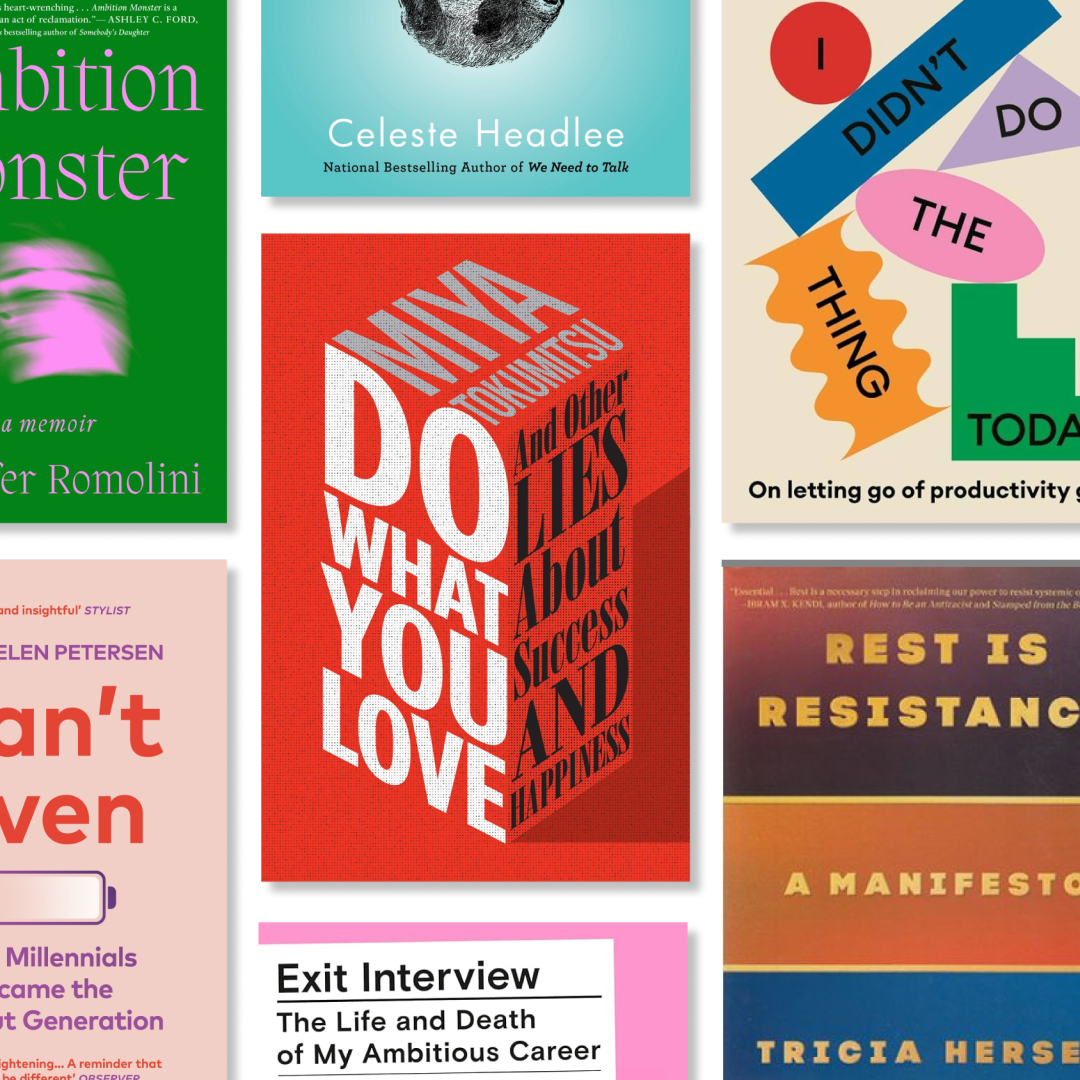 11 Books That Are the Antidote to Toxic Girlboss Hustle Culture
11 Books That Are the Antidote to Toxic Girlboss Hustle CultureThese memoirs and nonfiction titles will inspire you to focus on your personal ambitions.
By Andrea Park
-
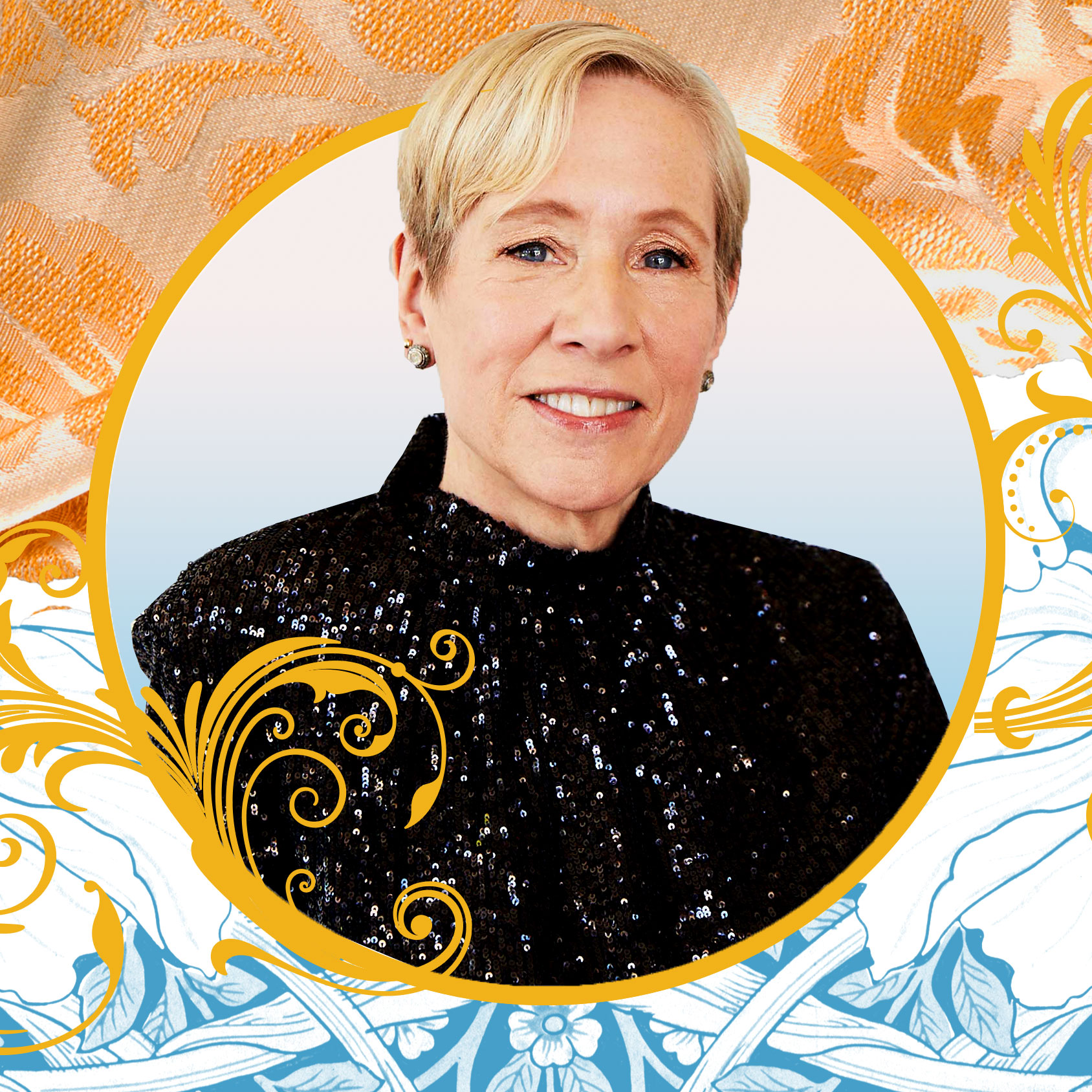 Almost Famous
Almost FamousHalf of the Shondaland dream team, the woman whose work brings 'Bridgerton' to life, is one of the most influential producers in Hollywood. And she’s ready for everyone to know it.
By Jessica M. Goldstein
-
 Payal Kadakia Is Finally Sharing Her Secret Sauce to Success
Payal Kadakia Is Finally Sharing Her Secret Sauce to SuccessIn her new book, LifePass, the ClassPass founder gives you the tools to write your own success story.
By Neha Prakash
-
 The Power Issue
The Power IssueOur November issue is all about power—having it, embracing it, and dressing for it.
By Marie Claire Editors
-
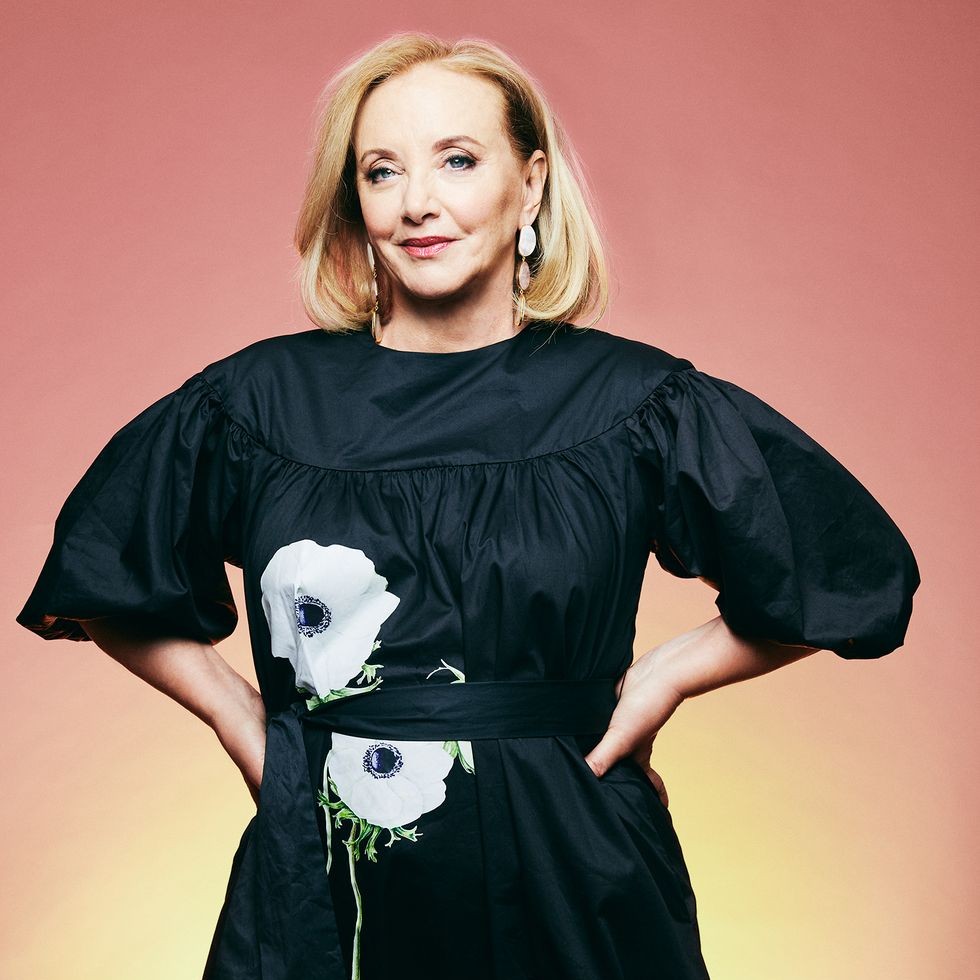 J. Smith-Cameron Is in Control
J. Smith-Cameron Is in ControlShe’s Logan Roy’s right hand. She’s Roman’s ‘mommy girlfriend.’ And she’s a fan favorite. Here, the Succession star takes us behind the scenes of Gerri’s boardroom power plays.
By Jessica M. Goldstein
-
 Hollywood Loves Books
Hollywood Loves BooksMany new streaming options mean big payoffs for authors when their work is optioned.
By Kate Dwyer
-
 What Makes an Olympic Moment?
What Makes an Olympic Moment?In the past it meant overcoming struggle...and winning. But why must athletes suffer to be inspiring?
By Megan DiTrolio
-
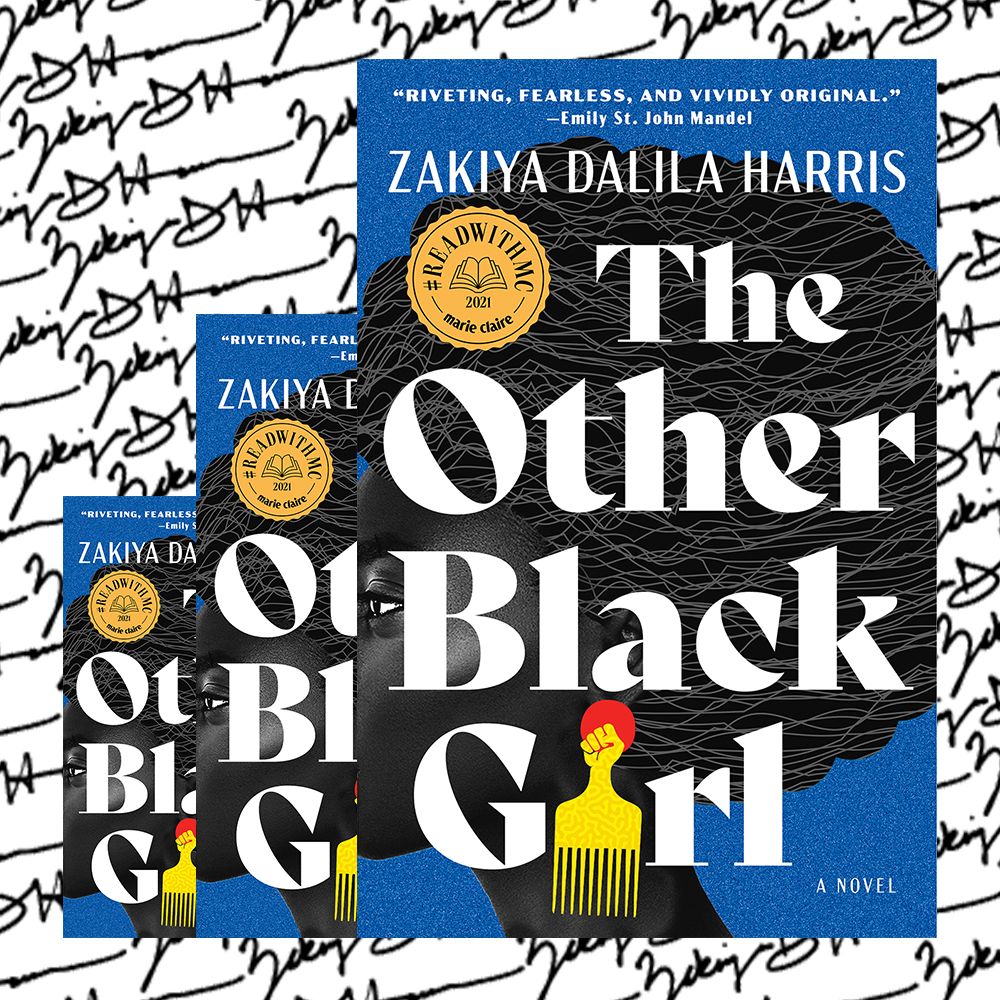 'The Other Black Girl' Gets Real About Racism in the Workplace
'The Other Black Girl' Gets Real About Racism in the Workplace"It really hits home how many spaces don’t allow Black women to really show up as their authentic selves."
By Rachel Epstein